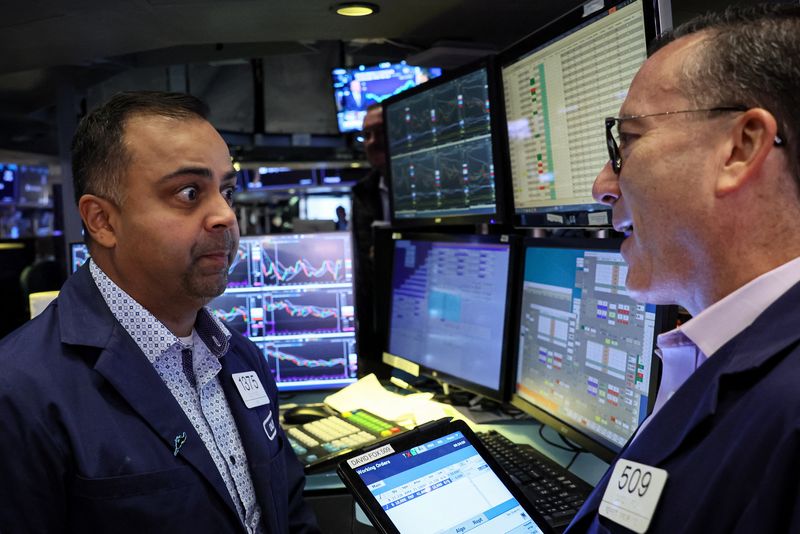By Caroline Valetkevitch
NEW YORK (Reuters) - The S&P 500 index closed at its lowest level since June 1 on Tuesday as economic data underscored the view the Federal Reserve may need to keep interest rates high.
The Dow turned negative for the year for the first time since June and ended at its lowest level since May 31. The Nasdaq also closed at its lowest since May 31.
Data showed U.S. job openings unexpectedly increased in August, fueling worries about a tight labor market ahead of Friday's key U.S. monthly jobs report.
Investors continue to closely watch benchmark Treasury yields, which hit 16-year highs on Tuesday.
"The scenario that most investors were assuming is the Fed would need to ultimately cut short-term rates, and we would return to a favorable interest rate environment," said Rick Meckler, partner at Cherry Lane Investments, a family investment office in New Vernon, New Jersey.
"But investors are seeing a different scenario now - higher rates for longer."
Higher borrowing costs are a negative for businesses and consumers.
All but one S&P 500 sector - utilities - were lower on the day, led by declines in consumer discretionary and technology. Growth companies tend to be among the hardest hit by rising yields.
The Dow Jones Industrial Average fell 430.97 points, or 1.29%, to 33,002.38, the S&P 500 lost 58.94 points, or 1.37%, at 4,229.45 and the Nasdaq Composite dropped 248.31 points, or 1.87%, to 13,059.47.
The CBOE volatility index, Wall Street's "fear gauge," hit its highest close since May 24.
Atlanta Fed President Raphael Bostic said there is no urgency for the central bank to raise its policy rate again, but it will likely be "a long time" before rate cuts are appropriate. Cleveland Fed President Loretta Mester said she is open to raising rates again, potentially at the bank's next meeting.
Shares of Amazon.com (NASDAQ:AMZN) and Microsoft (NASDAQ:MSFT) dropped after Reuters reported British media regulator Ofcom will push for an antitrust investigation into the companies' dominance of the UK cloud computing market.
Investors are getting ready for U.S. companies in the coming weeks to begin reporting on the last quarter, with some hoping the results could provide some positive news again for the market.
While the Dow is down 0.4% for the year, the Nasdaq remains up about 25% since Dec. 31 after a rally driven by enthusiasm over artificial intelligence.
Volume on U.S. exchanges was 11.16 billion shares, compared with the 10.57 billion average for the full session over the last 20 trading days.

Declining issues outnumbered advancers on the NYSE by a 5.61-to-1 ratio; on Nasdaq, a 3.52-to-1 ratio favored decliners.
The S&P 500 posted one new 52-week high and 63 new lows; the Nasdaq Composite recorded 15 new highs and 439 new lows.